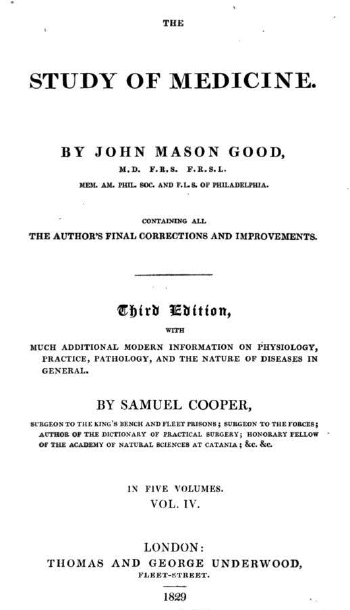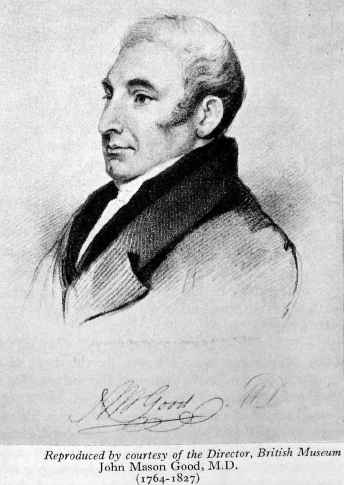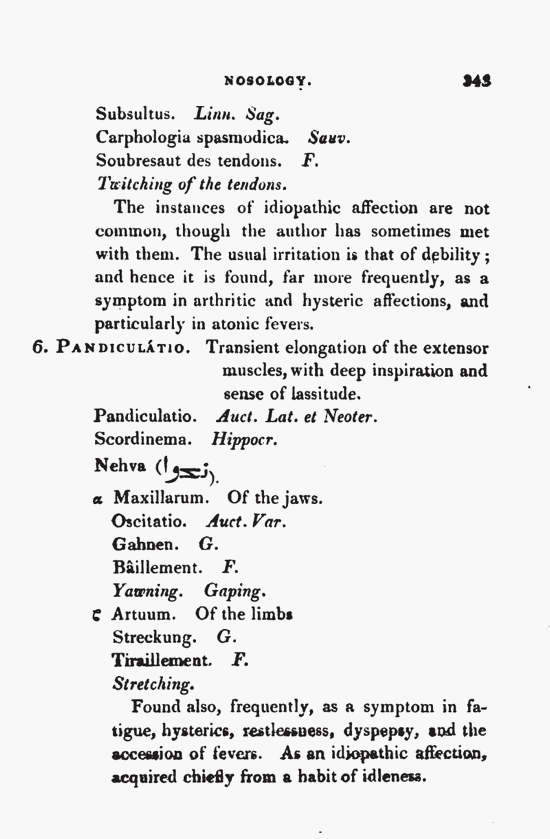-

-
-
- Pandiculation.
-
- Transient elongation of the extensor
muscles usually with deep inspiration and a
sense of lassitude.
-
-
- This is, perhaps, the slightest
modifications of spasmodic actions; but as it
often occurs, as in nausea on the first satge of
a febrile paroxysm, whether the will consents or
not, and is frequently and irregularly repeated,
it cannot but be regarded as belonging to the
present family on many occasions. The muscles
chiefly concerned are these extensors of the
lower jaw and of the limbs: the particular kind
of pandiculation, to which the first of these
movements gives rise being called
OSCITANCY, YAWNING, or
GAPING; and that produced by the second,
STRETCHING.
-
- The muscles are excited to this peculiar
action by a general feeling of restlessness or
disquiet; and the spread of the action from one
muscle, or set of muscles, to another is from
that striking sympathy, or tendency to catenate
is like movements, which we so often behold in
different parts of the body without being able
to explain. It is possible, however, that the
synchronous motion of the muscles of the lower
jaw and of the limbs, for it is rarely that
yawning and stretching do not accompany
each others may be dependent upon the same line
of intercourse, by which trismus so often
accompanies a wound in one of the extremities,
and which we have already attempted to
illustrate; the irritant power, in the one case,
leading to a fixed or entastic, and in the
other, to a transient and clonic spasm.
-
- Pandiculation, considered
physiologically, is an instinctive exertion to
recover a balance of power between the extensor
and flexor muscles, in cases in which the former
have been encroached upon and held in subjection
by the latter.
-
- A very slight survey of the animal frame
will show us, that the flexor muscles have, in
every part, some preponderancy over the
extensors; and that this preponderancy is
perpetually counteracted by the stimulus of the
instinct or of the will. We see it from the
first stage of life to the last, and most
distinctly in those states in which there is
most feebleness, and consequently in which the
controlling powers are least capable of
exercising and maintaming a balance. In the
fetus, therefore, in which the weakness is most
pressing, the power of instinct is merely rising
into existence, and no habit of counterpoise
established in the nascent fabric, every limb,
and part of every limb capable of bending,
undergoes sonie degree of flexure, and the
entire figure is rolled into a ball, as the
hedgehog habitually rolls himself, even after
birth. As the fetus, however, increases in size
and age and the powers of instinct, sensation,
and volition become more perfect, this general
conflexure produces occasionally a sense of
uneasiness; and hence every parturient mother is
sensible of frequent internal movements and
stretchings of the litle limbs of the fetus to
take off the uneasiness, by restoring some
degree of balance to the antagonist powers.
After birth, and during wakefulness the stimulus
of the will, directed rather to the extensor
thea the flexor muscles, renders the
counterpoise complete for all the purposes for
which it may be necessary. But the moment we
repose ourselves in sleep, and the will becomme
inactive and withdraws its control, the flexor
muscles exercise their preponderancy afresh,
though in a less degree than in fetal
life, since the extensors, from habitual
use, have acquired a more than proportionate
increase of power. The preponderancy, however,
when long exerted, still produces some degree of
disquiet, and hence, occasionnally during sleep,
and still more vigorously the moment we begin to
awake, we instinctively rouse the extensor
muscles into action; or, in other words, yawn,
strech the limb, and breathe deeply, to restore
the equipoise that has been lost during
unconsciousness.
-
-

-
- In all these cases, pandiculation is
a naturel action; it is an effect produced by
the will when it is called to the particular
state of these two state of muscles, or by the
instinctive or remedial power of nature, which
supplies its place, when it is dormant or
inattentive, to restore case to a disquieted
organ. But, in an infirm or debilitated
condition of the system, it evinces a morbid and
couvulsive character, and takes place without
our being able to prevent it, even when the will
uses its utmost effort to resist, instead of to
encourage it.
-
- How far its repetition may be of use in the
shivering fit of an ague, or in a nauseating
deliquium of the stomach, it is difficult to
say. Yet we are at no loss to account for its
frequency of recurrence: for as the whole system
is, in such circumstances, thrown into a sudden
prostration of strength, the extensor-muscles,
in consequence of being naturally weaker than
their antagonists, must become soonest
exhausted, and give way with a more than
ordinary submission to their power. And hence we
behold a painful retraction over the whole
system, and the preponderancy assumes a rigid
and spastic character, and we may fairly
conclude, that much of the yawning and
stretching, which ensue, is for the purpose of
getting rid of the constrictive spasm, though
these counteractions themselves often run, in
the attempt, into a spasm of another kind, and
become convulsive.
-
- Yawning and stretching then, are among the
signs of debility and lassitude. And, hence,
every one who resigns himself ingloriously to a
life of lassitude and indolence, will be sure to
catch these motions, as a part of that general
idleness which be covets. And, in this manner, a
natural and useful action is converted into a
morbid habit; and there are loungers to be found
in the world, who, though in the prime of life,
spend their days as well as their nights in a
perpetual routine of these convulsive movements,
overwhich they have no power; who cannot rise
from the sofa witb. out stretching their limbs,
nor open their mouths to answer a plain question
without gaping in one's face. The disease is
here idiopathic and chronic: it may, perhaps, be
eured by a permanent exertion of the will, and
ridicule or hard labour will generally be found
the best remedies for calling the will into
action.
-
 -
- John Mason Good
- The Study of Medicine with a
Physiological System of Nosology
- Philadelphia. Bennett & Walton,
et al. 1824 (first in USA)

|




